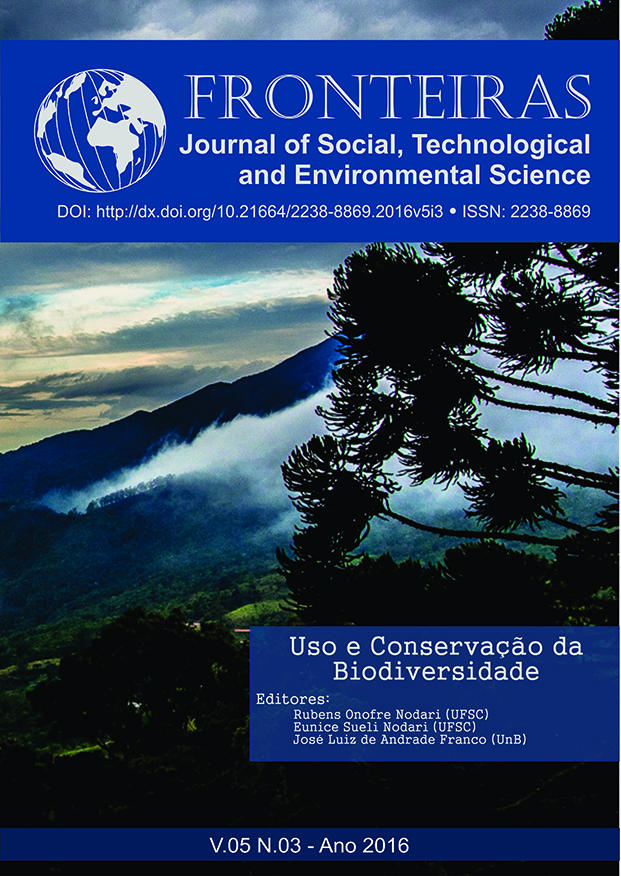Sustainability: an interdisciplinary field
DOI:
https://doi.org/10.21664/2238-8869.2016v5i3.p188-204Resumen
Discussed herein is the interdisciplinary nature of the sustainability sciences field. Through a critical historical account of so-called rationalisation of life and science, it is recognised that the economic growth model that prevailed over the last few centuries led to a disjunctive dissociation of our social systems from the natural systems, which now figures as a root cause of unsustainability. The same rationalisation arguably provoked the fragmentation of knowledge into more and more specialised disciplines, as part of a scientific framework that cannot now be readily applied to deal with current pressing socioenvironmental problems. It is argued that interdisciplinarity is the only academic response capable of achieving the reintegration of knowledge required to address the sustainability paradigm, as compromises are sought between what is essential, desired and possible, both within and without academia.Citas
Clark WC, Dickson NM 2003. Sustainability science: the emerging research program. Proceedings of the National Academy of Sciences, 100(14):8059-8061.
Costanza R, Graumlich LJ, Steffen W 2007. Sustainability or collapse? An integrated history and future of people on Earth. Report of the 96th Dahlem Workshop IHOPE, Berlin.
Dansereau P 1999. Uma preparação ética para a mudança global: prospecção ecológica e prescrição moral. In PF Vieira, MA Ribeiro, Ecologia humana, ética e educação, APED, Florianópolis, p. 299-370.
Diamond JM 2005. Collapse: how societies choose to fail or succeed. Viking, New York, 592 pp.
Durant W 2000. A história da filosofia. Nova Cultural, São Paulo, 480 pp.
Fernandes V 2008. Racionalização da vida como processo histórico: crítica à racionalidade econômica e ao industrialismo. Cadernos da EBAPE.BR, 6(3):1-20.
Fonseca IF, Bursztyn M 2009. A banalização da sustentabilidade: reflexões sobre governança ambiental em escala local. Sociedade e Estado, 24(1):17-46.
Frodeman R 2014. Sustainable knowledge: a theory of interdisciplinarity. Palgrave Macmillan, Basingstoke, 127 pp.
Gorz A 2003. Metamorfoses do trabalho: crítica da razão econômica. Annablume, São Paulo, 247 pp.
Habermas J 1994. Teoría de la acción comunicativa: complementos y estudios previos. Catedra, Madrid, 507 pp.
Horkheimer M 2002. O eclipse da razão. Centauro, São Paulo, 135 pp.
Illich I 1976. A convivencialidade. Europa-América, Lisboa, 137 pp.
Imberger J 2005. Water in a changing climate. In JHW Lee, KM Lam, Environmental hydraulics and sustainable water management, Taylor & Francis, London p. 1199-1218.
Jerneck A, Olsson L, Ness B, Anderberg S, Baier M, Clark E, Hickler T, Hornborg A, Kronsell A, Lovbrand E, Persson J 2011. Structuring sustainability science. Sustainability Science, 6:69-82.
Komiyama H, Takeuchi K 2006. Sustainability science: building a new discipline. Sustainability Science, 1:1-6.
Mannheim K 1962. O homem e a sociedade: estudos sobre a estrutura social moderna. Zahar, Rio de Janeiro, 490 pp.
Merico LFK 1996. Introdução à economia ecológica. EDIFURB, Blumenau, 160 pp.
Mihelcic J, Crittenden JC, Small MJ, Shonnard DR, Hokanson DR, Zhang Q, Chen H, Sorby SA, James VU, Sutherland JW, Schnoor JL 2003. Sustainability science and engineering: the emergence of a new metadiscipline. Environmental Science & Technology, 37:5314-5324.
Miller TR, Wiek A, Sarewitz D, Robinson J, Olsson L, Kriebel D, Loorbach D 2014. The future of sustainability science: a solutions-oriented research agenda. Sustainability Science, 9:239-246.
Morin E 2010. Ciência com consciência. Bertrand Brasil, Rio de Janeiro, 344 pp.
Neumayer E 2013. Weak versus strong sustainability. Edward Elgar, Cheltenham, 275 pp.
Polanyi K 1994. El sustento del hombre. Mondadori, Barcelona, 371 pp.
Ramos AG 1989. A nova ciência das organizações: uma reconceituação da riqueza das nações. Fundação Getulio Vargas, Rio de Janeiro, 209 pp.
Sachs I 2000. Caminhos para o desenvolvimento sustentável. Garamond, Rio de Janeiro, 95 pp.
Sampaio CAC 2010. Gestão que privilegia uma outra economia: ecossocioeconomia das organizações. EDIFURB, Blumenau, 145 pp.
Sandifer PA, Sutton-Grier AE, Ward BP 2015. Exploring connections among nature, biodiversity, ecosystem services, and human health and well-being: Opportunities to enhance health and biodiversity conservation. Ecosystem Services, 12:1-15.
Santos BS 1995. Um discurso sobre as ciências. Afrontamento, Porto, 92 pp.
Satanarachchi N, Mino T 2014. A framework to observe and evaluate the sustainability of human–natural systems in a complex dynamic context. SpingerPlus, 3:618-638.
Sidle RC, Benson WH, Carriger JF, Kamai T 2013. Broader perspective on ecosystem sustainability: Consequences for decision making. PNAS, 110(23):9201-9208.
Simmel G 2005. As grandes cidades e a vida do espírito (1903). Mana, 11(2):577-591.
Spangenberg JH 2011. Sustainability science: a review, an analysis and some empirical lessons. Environmental Conservation, 38(3):275-287.
UNESCO / IHP / WWAP 2003. Water security and peace: a synthesis of studies prepared under the Water for Peace Process. Technical Documents in Hydrology, PC-CP Series, no. 29.
World Commission on Environment and Development 1991. Our common future. United Nations, New York, 300 pp.
Descargas
Publicado
Cómo citar
Número
Sección
Licencia
Esta revista oferece acesso livre imediato ao seu conteúdo, seguindo o princípio de que disponibilizar gratuitamente o conhecimento científico ao público proporciona maior democratização mundial do conhecimento.
A partir da publicação realizada na revista os autores possuem copyright e direitos de publicação de seus artigos sem restrições.
A Revista Fronteiras: Journal of Social, Technological and Environmental Science segue os preceitos legais da licença Creative Commons - Atribuição-NãoComercial 4.0 Internacional.


